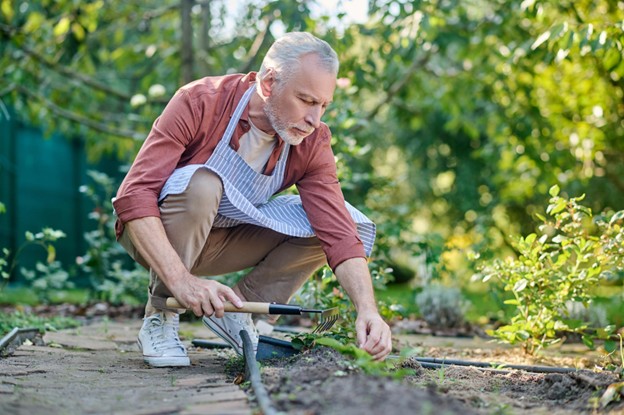Caution!!! Links in this article are provided by the guest author and may link to Content Marketing / Native Advertising and other sites containing first and third party ad trackers and cookies, along with other privacy threats such as passing on your info to social media sites. We urge our readers to take precautions such as using privacy browsers, ad-blocking apps, VPNs, anti-tracking devices, disabling third-party cookies and other appropriate measures before clicking on any external links.
Image Source: Pexels
 A mid-life crisis can feel like a private storm, one that shakes your sense of purpose and unsettles your relationships, faith, and vision for the future. For Christians, it can be a strange and sometimes lonely place to stand — caught between what’s been built and what’s still unfinished. The good news is that God’s Word and the lived wisdom of believers offer not just comfort, but a path forward. Inspiration isn’t a magic spark that appears in perfect moments; it’s something we cultivate in the middle of difficulty. Positivity is not a shallow optimism, but a steadying trust that God can work good out of the most uncertain seasons. These years can become a refining fire, not a dead end.
A mid-life crisis can feel like a private storm, one that shakes your sense of purpose and unsettles your relationships, faith, and vision for the future. For Christians, it can be a strange and sometimes lonely place to stand — caught between what’s been built and what’s still unfinished. The good news is that God’s Word and the lived wisdom of believers offer not just comfort, but a path forward. Inspiration isn’t a magic spark that appears in perfect moments; it’s something we cultivate in the middle of difficulty. Positivity is not a shallow optimism, but a steadying trust that God can work good out of the most uncertain seasons. These years can become a refining fire, not a dead end.
Embrace Your Faith
Some moments in life press us hard enough to make us listen in ways we’ve avoided before. A mid-life crisis can be just that — a divine nudge to re-center your life on what truly matters. Instead of interpreting the struggle as pure loss, consider what if your midlife crisis is a wake-up call to slow down and hear God’s voice in the noise. Scripture is full of people who faced turning points in the middle of their story: Moses at the burning bush, David in the caves, Paul on the road. Each found new strength and direction by trusting God’s leading rather than clinging to their old plans. Allow prayer and the Word to become not just a daily habit, but a place where your new season begins to take shape.
Practical Life Tools
Sometimes the most immediate relief in a stressful season comes from removing small daily frustrations. For example, reducing tech-related headaches can create more mental space for prayer, rest, and focus. Knowing a few ways to convert files to PDF without fuss can cut down on wasted time at work or in ministry prep. These small efficiencies, though they seem unrelated to spiritual renewal, can clear away unnecessary stress so your mind and heart can attend to bigger, more eternal matters.
God’s Steadfast Keeping
There’s comfort in knowing that your stability isn’t dependent on your own grip. As life shifts and questions pile up, resting in God’s steadfast keeping anchors your hope in something unshakable. He is the one who carries you through — not your willpower, not your strategies, but His faithful character. This truth dismantles the fear that you’ll somehow “fail” at navigating this stage. It reminds you that your life is held by hands far stronger than your own, and that every season is within His reach.
Education as a Reset Path
For some, a mid-life crisis is tied to career dissatisfaction or a longing for new challenges. In such cases, pursuing further education can serve as a practical and hope-filled step forward. Exploring the IT bachelor of science degree requirements might open doors to fresh vocational opportunities, providing both a mental reset and a renewed sense of purpose. Learning something new can reignite confidence, expand your community, and create pathways for service you hadn’t considered before.
Find Community & Serve
Isolation has a way of distorting reality. When you serve alongside others, even in small ways, you see that you’re part of a much bigger story than your personal crisis. By letting service reshape your outlook, you open yourself to encounters that shift your perspective and remind you of God’s work in the world. Volunteering at your church, mentoring a younger believer, or joining a local outreach effort puts you shoulder to shoulder with people who also need encouragement. This shared work pulls you out of self-focus and into God’s mission, often bringing joy you didn’t know you’d lost.
Recalibrate Rather Than Collapse
The temptation during a mid-life crisis is to see it as a collapse, a sign that something’s irreparably broken. But it can also be a point to pause and intentionally shift course. You might start steering mid-life recalibration with intention by asking questions about your calling, habits, and the priorities you’ve set over the years. This isn’t about tearing your life down but about refining it — clearing space for the commitments and people who matter most. By approaching this time as a God-led audit, you replace panic with purpose and turn uncertainty into fertile ground for growth.
Creative Renewal
In the thick of change, creativity can become an unexpected lifeline. Mid-life offers the chance to rediscover or develop practices that connect you with God in fresh ways. Some believers find that rediscovering faith through creative practice — whether through painting, gardening, writing, or music — opens new channels for prayer and reflection. Creative acts invite you to slow down, notice beauty, and see God’s hand in the process of making. The act itself becomes a form of worship, a way of honoring the Creator by imitating His inventiveness.A mid-life crisis doesn’t have to be a breaking point; it can be a turning point. The years ahead can be shaped by faith that listens closely, service that connects deeply, and creativity that refreshes the spirit. Let God’s keeping power steady you, let practical shifts lighten your load, and let purposeful steps guide you toward what’s next. The season you’re in now might hold the seeds of your most meaningful growth — not because it’s easy, but because God is working through it. And that truth, in the end, is where both inspiration and positivity find their deepest roots.
 Gardening isn’t just about flowers and vegetables; it’s a full-body, mind-centering ritual that offers older adults a sense of vitality. Each seed planted carries more than the promise of a harvest—it offers strength, focus, and the quiet satisfaction of creating life from the soil. For those who feel the tug of time in their joints or the weight of isolation, the garden becomes an anchor. It's a place where movement has purpose, food has meaning, and every green shoot feels like proof that something good is still unfolding.
Gardening isn’t just about flowers and vegetables; it’s a full-body, mind-centering ritual that offers older adults a sense of vitality. Each seed planted carries more than the promise of a harvest—it offers strength, focus, and the quiet satisfaction of creating life from the soil. For those who feel the tug of time in their joints or the weight of isolation, the garden becomes an anchor. It's a place where movement has purpose, food has meaning, and every green shoot feels like proof that something good is still unfolding.